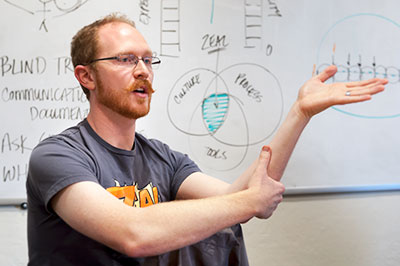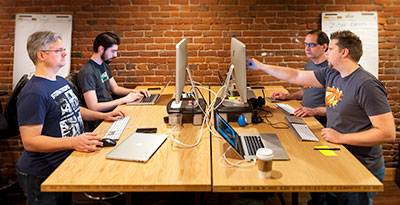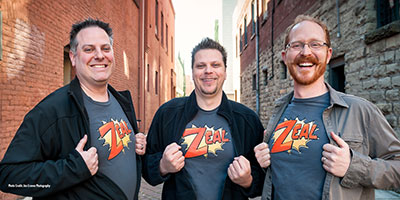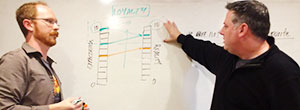
Above: Adam Cuppy speaking on leadership (photo by Jim Craven; courtesy of The Southern Oregon Edge)
Why do most businesses fail? Is it lack of resources? Poor marketing? Untrained employees? Or perhaps it’s their location—the company’s too far away from the epicenter of their industry, too under the radar to get noticed.
None of the above, according to Coding ZEAL co-founder Adam Cuppy. He thinks it’s because “their leadership is very poor.” His fellow founders Sean Culver and Trever Yarrish agree.
Drawing a diagram of a snow-capped mountain, Adam explains, “Leaders tend to think they need to … stand on top of the mountain. Reality is,” he continues, “they’re the one holding it up.”
Instead of being on a power trip, leaders should practice humility and service. By switching from proclaiming to listening, managers learn valuable truths from their employees, customers and the community.
Leaders can get stuck in a circular loop, asking and then answering their own questions. This is when stagnancy occurs.
The leader who stands on the top of the mountain “always has the answer.”
Coding ZEAL turns that model upside-down. “As leaders, our responsibility is to ask questions constantly,” says Adam. “The problem is that if it’s the same person that’s answering the question, you run into a dilemma because it’s not giving an opportunity to the other people in the organization to help you answer that.”
At Coding ZEAL, every new employee becomes a partner in a way. The structure is not flat, but it’s agile and encourages creative collaboration.
Hire for Culture
The three founding partners agree culture is crucial to their success. “We hire for culture fit and we hire for empathy and we hire for capacity,” says Adam. “You don’t hire for current talent necessarily. That actually becomes an added benefit.”
Coding skills and algorithms can be taught; empathy, zealotry and excitement must come from within.
We’ve blogged about the centrality of culture to authentic branding in past articles such as Creating Your Brand from the Inside Out: Why Your Culture Comes First, and Coding ZEAL is yet one more successful example of this principle in action.
Growth
“We are only limited by our perceived constraints,” says Adam.
That optimistic philosophy has paid off. “We’re at a point now that is super exciting and fun,” says Adam. “It feels we’re constantly bursting at the seams. We’re always in that catch-22 of capacity being maxed out and needing to hire more people.”
Good leadership involves finding that sweet spot between too many and too few employees. You don’t want to grow so quickly that the culture becomes diluted, nor do you want to grow so slowly that your employees become overworked.

Above: Coding ZEAL developers pair programming (photo by Jim Craven; courtesy of The Southern Oregon Edge)
Pair Programming
Guided by Kent Beck’s extreme programming (XP) principles, Coding ZEAL developers practice pair programming. Not only does this allow veteran programmers to mentor newer employees, but when two minds focus on a task, they can spot and resolve problems far more quickly.
“Randy is bringing his expertise to the table, Sean’s bringing his expertise to the table, and where they overlap, greatness happens,” says Adam. “Where they don’t overlap, the other one’s learning.”
By investing in skill-building and education, Coding ZEAL is laying the groundwork for happier, and thus more productive, employees.
Code Occasions
“People are everything, you have to rock everybody’s world,” says Adam.
Knowing how mentally taxing coding all day is, Adam notes, “It’s imperative that there be developer happiness.”
Coding ZEAL leaders recognize that for their programmers, “much of that happiness has to focus around … mental space,” Adam says.
That is why they came up with the idea of code occasions. Coding ZEAL actually pays for its developers to go off and play, to create and imagine and implement their own ideas in a fresh and stimulating environment with one or two coworkers.
“It’s the inspiration, that cross-pollination,” says Adam, “that’s huge in everything we do.”
Employee Happiness
 When you have happy, fulfilled employees whose creativity is stretched and nourished, the company flourishes, too.
When you have happy, fulfilled employees whose creativity is stretched and nourished, the company flourishes, too.
Driven by a superhuman enthusiasm, Coding ZEAL developers gladly devote hours of intense focus to deliver products that exceed customer expectations. For them, this isn’t a job; it’s a calling.
By cultivating employee happiness, Coding ZEAL leaders enjoy unbridled loyalty from their programmers, whose emotional connection with the company results in sentiments like, “I will show up on the weekends if I have to. I will do what I have to because I have this vision driving my ambition,” explains Adam.
If poor leadership is why businesses fail, Adam’s, Sean’s and Trever’s empathetic leadership is why companies succeed.
To read more wisdom from Coding ZEAL founders, see our last article on the secret to exceeding customer expectations.


 To illustrate this concept, Adam draws two columns, one representing customer expectations and the other reality, each with a scale ranging from 1 to 10. The customer relationship begins when expectations meet reality.
To illustrate this concept, Adam draws two columns, one representing customer expectations and the other reality, each with a scale ranging from 1 to 10. The customer relationship begins when expectations meet reality.


